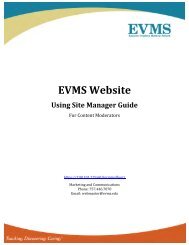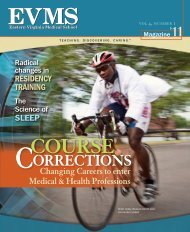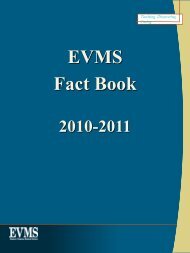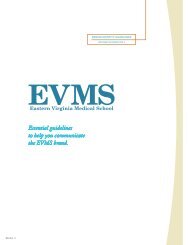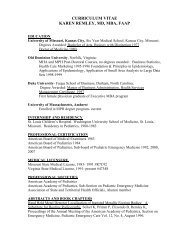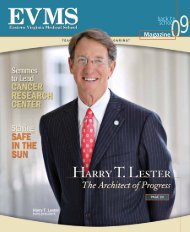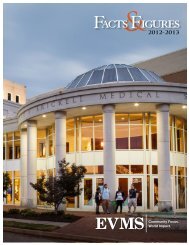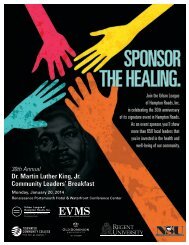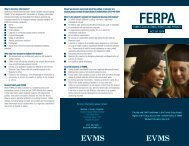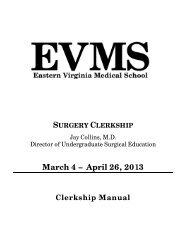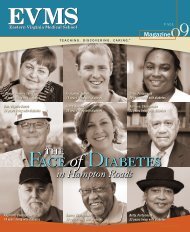newsCancer centers team up to targetkidney cancerGraduate student Tiffany Benzine examinesa sample of kidney tissue. The top half ofthe sample is normal while the bottom halfis cancerous.Two talented biomedical research teamswith extensive experience in studyingcancer are combining their expertiseto focus on kidney cancer, one of the 10 mostcommon forms of the disease.Physicians and scientists at <strong>Eastern</strong> <strong>Virginia</strong><strong>Medical</strong> <strong>School</strong> and the Mayo Clinic are jointlyconducting a three-year study of kidney cancerthat is supported by a $1 million grant from theU.S. Department of Defense.The purpose of the research is to develop moreaccurate ways to determine which forms of kidneycancer are likely to be aggressive — and lethal.EVMS is among the world’s leaders in studyingproteins — the chemical messengers in cells —for clues to the presence of disease. Our researchin the field known as proteomics has turned upunique chemical fingerprints — called protein“biomarkers” — that can signal disease and,increasingly, measure a tumor’s potential to doharm. EVMS brings this expertise to bear on itslatest target.“We want to understand the underlyingmechanisms of aggressiveness for the most commonform of kidney cancer: clear cell renal cancer,” saysRichard Drake, PhD, professor of microbiologyand molecular cell biology at EVMS and a partof the newly created Leroy T. Canoles Jr. CancerResearch Center.The purpose of the research isto develop more accurate waysto determine which forms ofkidney cancer are likely to beaggressive — and lethal.“Our part of the project is to conduct a newtissue-imaging approach to find protein biomarkersfor kidney-cancer aggressiveness,” says Dr. Drake,who is co-principal investigator on the study withAlexander S. Parker, PhD, assistant professorof epidemiology at the Mayo Clinic College ofMedicine in Jacksonville, Fla.The Mayo Clinic has one of the world’s mostextensive collections of cancerous kidney tissue. TheResearchers are studying tiny slivers of cancerous kidneytissue to learn how to battle the disease.teams will draw on these samples as part of theirresearch.Metabolon, a company based in North Carolinathat is also part of the research project, is analyzingchanges in the cellular metabolites using those samefrozen samples of cancerous kidney tissue.The researchers hope these two types ofbiomarkers, combined with other details — suchas a pathologist’s report — will provide a bettermeasure of a cancer’s aggressiveness and help guidetreatment decisions.“Our goal is to develop a biomarker-basedprediction model that will help clinicians moreaccurately predict which kidney-cancer patients areat greatest risk for the return of the cancer after theinitial surgery,” Dr. Drake says.Continued on page 174 FALL <strong>2010</strong> www.evms.edunews
Researchers support development ofgroundbreaking prostate cancer vaccineResearch and clinical trialscompleted at <strong>Eastern</strong> <strong>Virginia</strong><strong>Medical</strong> <strong>School</strong> have led toa major breakthrough in thetreatment of cancer. In April, theFood and Drug Administration(FDA) approved the vaccineProvenge, a new treatment forprostate cancer.Researchers at EVMS, ledby urology professor Paul F.Schellhammer, MD, havebeen investigating the vaccine’seffectiveness for more than adecade and played a major role in its approval.Through his research as an EVMS communityfaculty member and his private clinical practice,Dr. Schellhammer is one of the first to makeProvenge available to patients.Developed by Dendreon Corp., a biotechcompany based in Seattle, Provenge is the firstFDA-approved immune-based cancer therapy. Itworks by using the body’sown immune system asa weapon against cancercells. Dr. Schellhammer, anational leader in prostatecancer research, says theapproval of Provengeis especially significantbecause it could lead tothe use of immune-basedtreatments for other typesof cancer.“This is an entirelynew class and level oftherapies that work totally differently from what’scurrently available,” he says. “One of the dramaticadvantages is that the patient’s own immunesystem is being stimulated to be more activeagainst the cancer. There are no external poisons,chemotherapies or other oral agents being used.They have their place, but one of the attractionshere is that the patients rarely have side effects.”Paul F. Schellhammer, MDAfter 10 years of clinical trials involvingmore than three dozen local patients, Dr.Schellhammer’s research team determinedthat the Provenge vaccine can extend the livesof patients with advanced prostate cancer byanywhere from four months to three years, withminimal side effects.One of the dramaticadvantages is that thepatient’s own immune systemis being stimulated to be moreactive against the cancer.“It’s a win-win situation,” Dr. Schellhamersays. “Not only are you improving your ownbody’s mechanisms, but you are achieving thatend without significant impact on your qualityof life.”Scientist focuses on pancreatic cancerEVMS scientist Amy Tang, PhD, hopes she hasfound the Achille’s heel of pancreatic cancer, thefourth deadliest form of the disease.To aid her research, Dr. Tang, an associateprofessor of microbiology and molecular cellbiology, has received a $200,000, two-year“innovative grant” from the Pancreatic CancerAction Network and the American Associationfor Cancer Research. The funds will support herstudy of a new drug target for pancreatic cancer,known as the “silent killer” for its ability to avoiddetection.The money and research are sorely needed.According to the American Cancer Society, about38,000 people in the U.S. will be diagnosed withpancreatic cancer this year alone. Of those, about34,000 will die of the disease.The ultimate goal of Dr.Tang’s research is to block tumorformation in “one of the mostaggressive human cancer cellsknown,” she says.She is targeting a protein calledSIAH, which has been shown toencourage cancer growth. Researchers believe itis responsible for supercharging a protein calledK-RAS.K-RAS normally promotes growth at ahealthy pace. In its abnormal form it kicks intooverdrive and increases cell growth in peoplewith pancreatic cancer.“Hyperactive K-RAS protein acts like a car’s gaspedal that is permanently stuck in the acceleratorposition and propels the pancreatic cancer cellsto grow and metastasizeuncontrollably,” Dr. Tangsays.If anti-SIAH therapy caninhibit this acceleration effect intumor growth and metastasis,it could become a potent andkey target for drug development that would throttleK-RAS signaling in human pancreatic cancer.“Albeit at an early preclinical stage, knowledgegained from this study has great promise andimmediate translational value,” she says.Dr. Tang is the first EVMS researcher honoredby the American Association for Cancer Research(AACR) and the first in Hampton Roads to securegrant funding from the AACR and the PancreaticCancer Action Network.Amy H. Tang, PhDnewswww.evms.edu FALL <strong>2010</strong> 5



